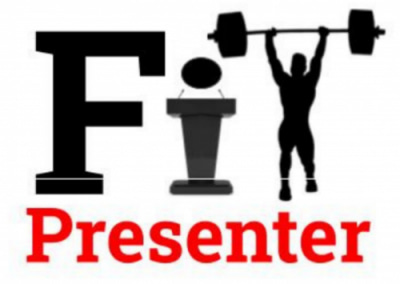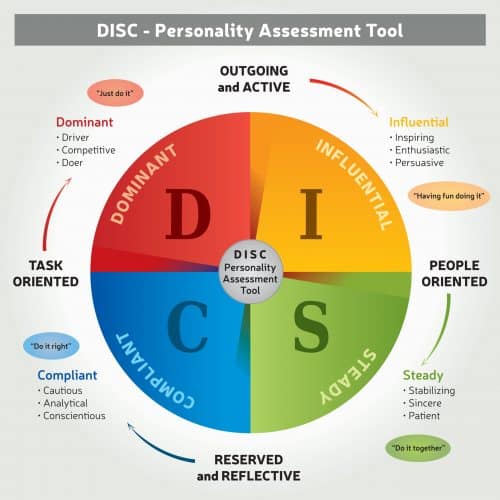When you meet a client for the first time, how do you decide what questions to ask?
What do you really want to know about the client? Standardized intake forms (three ugly words that should be purged from our industry forever) account for medical history, exercise history (liar liar) dietary habits (pants on fire), and an inventory of specific, haphazard, irrelevant, time consuming goals (I think there’s an acronym for that). But what about the client’s human side? If you want to document their personality, motivations, and attitudes about exercise, you have to create your own forms. Luckily, the assessment tools already exist.
The DISC personality profile
With a few quick questions, you can put your client into one of four personality categories. With that information, you can tailor your approach. Should you hold their hand and tell them they will love the workout? Maybe they want a load of details to be sure that the program is well-planned. In other cases, humor matters most. Another possibility is to simply say, “Okay, now let’s get to work.” Which approach works the best? That depends on your client’s personality.
D -- The driver. This is your type A personality. They like to be in charge and want to get things done. They don’t have patience for details. They think more than they feel.
I -- The influencer. They like to have fun. They would rather persuade people than give orders.
S -- The sentimental one. This person cares mostly about other people’s feelings. They feel more than they think.
C -- The conventional one. This person loves details. They love to follow steps and procedures.
What does that mean to you as a trainer?
Once you determine their personality style, you know the best way to communicate and motivate.
In the first training session with my client, I always ask, “How is the weather?” Their answer almost always gives away their DISC type.
A “D” will answer with one or two words.
An “I” will probably tell a story or describe the scene.
An “S” will tell you that it’s cold and that you should wear a jacket.
A “C” will give you a meteorologist report.
The first time you discover a client’s personality type, you can not prepare for that Eureka moment. Try to hide your excitement. The communication portal is now open and will stay that way.
How do we use this information?
For a "D" personality, let them make as many decisions as possible. Even though they are no-nonsense people and like blunt instructions from a trainer, they also need to feel like they are in charge. As they build confidence and know-how in the gym, give them a chance to select their own exercises.
“I” personalities like to play games. Your responsibility, and it’s a very serious one, is to make the routine fun. Give every exercise and every machine a special name. Let them jump up and down on the BoSu, just because you can.
“S” personalities feel more vulnerable than most. Give them a chance to do what they do best and offer you comfort. When you need to break the ice or build rapport, tell the client a little something about yourself (just a little something -- remember, the client is not your therapist). Without dumping too much personal cargo, give them a little tidbit about your family or your pets. This will knock you down a peg in their eyes and bring you to their level.
A “C” personality wants details, so give them details. Explain the joint actions and the muscles that you recruit. Give them a nutrition plan with charts and graphs. When you ask a question, expect a long answer.
Why does it matter?
The number one reason your client is coming to see you is that they don’t like the gym. You will never win a client over with useless paperwork.
Try filling out 20 minutes worth of forms and checklists before your next workout, and see how well you do in the gym!
Even though we see constant developments in training systems and online coaching platforms, the paperwork has never changed. After all these years, we are still pulling the same useless information.
As a personal trainer, client rapport is your number one marketing tool.
More than anything else, our clients come from referrals. In word-of-mouth advertising, your only promotional device is your instant rapport. The client doesn’t want to know the features and benefits that we learned in our Principles of Marketing class. They are not impressed with your ability to decelerate the talus over the calcaneus in three planes while exercising in a closed kinetic chain (that’s why I drop it on you instead). They want a personal connection. We connect through communication. We communicate by speaking to their personality type.
This sounds like a head game
Are we playing Pretty Boy Freud on the training floor by tearing open their psyche? Only if you abuse it. If you say the wrong thing just to provoke a reaction and laugh about it later, this article and this profession are not for you. We use the personality indicator to learn how they wish to be treated. It is no different than varying your tone of voice based on the client’s age, gender, energy level or sense of humor.
Support the mission
FIT Presenter seeks to raise the professional profile of the entire fitness industry through top-level communication. Although this is a public speaking coaching business first, we cover all modes of client outreach in order to get the respect that we individually and collectively deserve.















